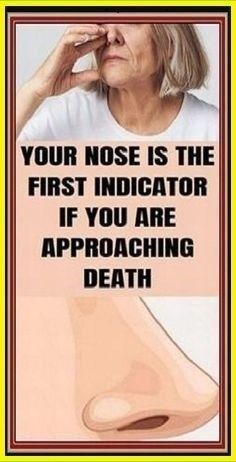The human body is a complex, interconnected system, with different signals and indicators that can provide insight into our health. While many factors contribute to our well-being, recent scientific studies have suggested an interesting relationship between the sense of smell and proximity to death. In this article, we delve deeper into the research and explore the potential role of the nose as an early indicator of approaching mortality.
Olfactory system and health:
The olfactory system, which is responsible for our sense of smell, is a fascinating and often underestimated component of the human body. It consists of specialized sensory cells in the nose that detect and process odors, and send signals to the brain to interpret them. In addition to its role in helping us appreciate the smell of a delicious meal or the scent of flowers, the olfactory system has been found to have potential links to our overall health.
Research results:
Recent studies have indicated that changes in the sense of smell may be associated with various health conditions, including neurological diseases such as Alzheimer’s and Parkinson’s disease. Furthermore, a study conducted by researchers at the University of Chicago suggested that a reduced ability to recognize certain odors could be an indicator of a shorter lifespan.
Olfactory relationship and mortality:
The study, which included thousands of participants over several years, found that those with a poor sense of smell were more likely to die during the follow-up period compared to individuals with a normal sense of smell. Researchers believe that the olfactory system may act as an early warning system, detecting changes in the body that could be an indicator of underlying health problems.
Possible mechanisms:
While the exact mechanisms linking the sense of smell to death are not yet fully understood, several hypotheses have been proposed. One possibility is that damage to the olfactory system may reflect broader damage to the nervous system, affecting various body functions. Another theory suggests that the olfactory system may be affected by systemic diseases that affect the body as a whole.
Practical outcomes:
Although the research is still in its early stages, the findings raise interesting questions about the potential use of olfactory assessments in health care. Monitoring changes in the sense of smell could provide a non-invasive, cost-effective way to identify individuals at risk of developing certain health conditions or shortening lifespan. However, more research is needed to determine the reliability and specificity of olfactory indicators as predictors of mortality.
While the idea that your nose could be the first indicator that you’re approaching death may seem exciting, scientific studies are revealing interesting links between the olfactory system and overall health. As researchers continue to investigate these links, the potential for olfactory assessments to play a role in preventive health care and early detection of health problems is an exciting avenue to explore. In the meantime, our noses may continue to provide us with more than just the pleasure of experiencing pleasant scents, they may be silently sending important messages about our well-being.



